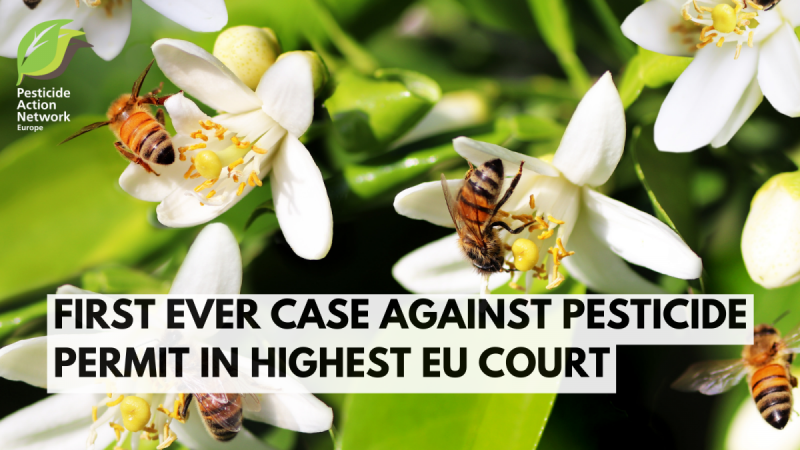Last week we took a historic step. For the very first time, pesticide approval is challenged in appeal in the Court of Justice of the EU. This was not possible before. PAN Europe filed the appeal concerning the approval of endocrine disruptor and bee killer cypermethrin. We ask the court to ensure the high level of protection of citizens' health and the environment that is enshrined in EU law. The law embraces health and the environment and the precautionary principle. But at the implementation level, both the EU Commission and Member States bend and twist the rules to serve the interests of pesticide producers and industrial farming. We are convinced this is illegal and therefore we challenge pesticide approvals in court to stop this.
Our case against cypermethrin is the very first of its kind. For many years civil society organisations had no access to the EU court for these matters. The only indirect way to get an opinion from the EU Court of Justice was to do procedures in a national court and propose the judges to ask for so-called 'preliminary rulings'. Via this route we did manage to achieve legal successes, like the groundbreaking verdict to stop the abuse of derogations for banned pesticides in January 2023. Followed by last month’s important verdict where the EU Court of Justice concluded that Member States pesticide authorities – in this case, the Dutch CTGB – should use the latest scientific insights. Pesticide formulations also need to be tested for their endocrine-disrupting properties. Read more on the ruling here.
The long fight to gain access to the EU court
As access to justice was not granted, NGOs had to fight a long battle to gain it. A right that has always been guaranteed for the industry. They can challenge a decision in the rare case that one of their products is not allowed on the market. But strange enough citizen organisations could not challenge the use of a product, even if it harms their health or their environment.
This changed when the 1998 Aarhus Convention provided the public the right to challenge decisions conflicting with EU environmental law in court. However, the way the EU transposed this convention into EU legislation severely limited court access for civil society organisations. PAN Europe did manage to get a landmark court verdict in 2021, that granted us access to challenge so-called non-legislative acts of general scope, including pesticide approvals. The EU Commission appealed the decision and to our disbelief, the Grand Chamber of the EU Court decided in 2015 that we had no right on access to court on this matter after all.
This led to complaints by civil society before the Aarhus Convention Compliance Committee. As a result, the EU Commission was obliged to revise its legislation in order to grant broader access to justice to citizens. In October 2021, 23 years after signing the convention, the EU legislation on the Aarhus regulation was amended (regulation 2021/1767/EC). Finally, civil society had the possibility to challenge pesticide approvals at the EU level.
The cypermethrin case: first ever by NGO against EU pesticide approval
So we did. We filed a case against the re-approval of cypermethrin, following the required legal steps. It started in 2021 with a request for an internal review by the European Commission. When the request was turned down in 2022 we asked the General Court of the EU to annul this negative decision. In February 2024 the court ruled in favour of the European Commission and dismissed our request for annulment. So now, in May 2024, we lodged the appeal as the very first case of this kind at the EU Court of Justice.
We think that the judgment is not in line with relevant EU legislation and case law. We have many arguments and refer to the recent ruling where the Court of Justice reaffirmed that citizens' health and the protection of the environment must be given priority, while most recent scientific information must be taken into account.
The European Commission reapproved cypermethrin without a proper risk assessment of its endocrine-disrupting properties, by accepting countless data gaps in the reapproval dossier, and by imposing risk mitigation measures impossible to meet by farmers. For instance, the Commission imposed to limit spray drift up to 99.7%, although these unrealistic measures have never been proven to be effective, as EFSA itself admitted.
Martin Dermine, PAN Europe executive director said: "The facts presented by PAN and the discussions in the General Court have clearly shown the European Commission’s lack of commitment to implement rules regarding the approval of pesticides. We think the judgment from the General Court is not aligned with the high level of protection of citizens' health and the environment enshrined in EU law."
Salomé Roynel, a policy officer at PAN Europe said: "This judgment does not encourage EFSA to comply with legal and scientific standards when publishing its conclusions on pesticides. It could give an incentive to the pesticide industry to provide incomplete dossiers on genotoxicity or toxicity to the environment."
Martin Dermine concluded: "Two recent judgments delivered in favour of PAN Europe before the Court of Justice confirmed that regulators cannot approve pesticides without a thorough assessment of their toxicity. The Court reaffirmed that citizens' health and the protection of the environment must be given priority, while the most recent scientific information must be taken into account. We trust that the Court will follow this line of reasoning and that endocrine disruptor cypermethrin will finally be banned".
